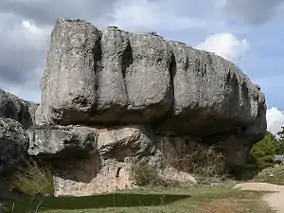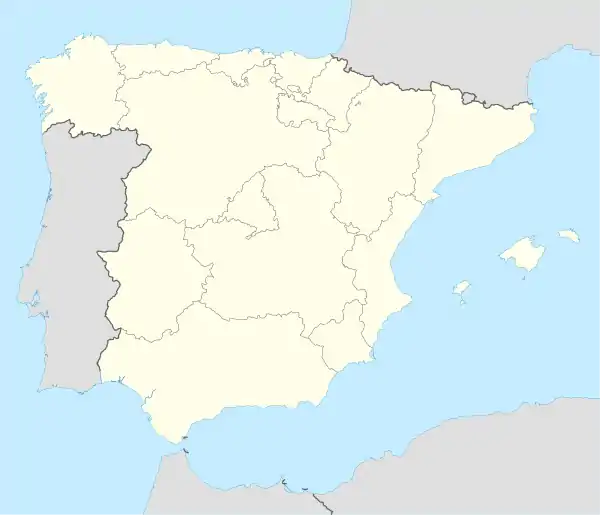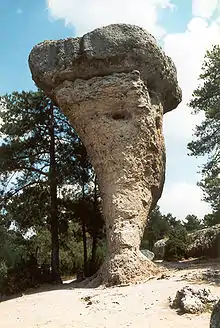Ciudad Encantada
The Ciudad Encantada (English: Enchanted City) is a geological site near the city of Cuenca, in the autonomous community of Castilla–La Mancha, Spain in which the erosive forces of weather and the waters of the nearby Júcar river have formed rocks into distinctive and memorable shapes.[1]
| Ciudad Encantada | |
|---|---|
IUCN category III (natural monument or feature) | |
 Rock wall in Ciudad Encantada | |
 Location of Ciudad Encantada | |
| Location | Cuenca, Spain |
| Coordinates | 40°12′29″N 2°0′35″W |
| Area | 250 acres (100 ha) |
| Established | 1929 |

It was declared a Natural Site of National Interest on 11 June 1929.
Origin of the formations
The rock formations of Ciudad Encantada are karst formations made of limestone and dolomite, which date back to the Cretaceous period, approximately 90 million years ago.[1] Rain falling on the original limestone plateau wore down the porous limestone, leaving behind the more resistant dolomite. Because the dolomite was not always distributed evenly in the original rock, the result was the irregularly eroded shapes that form the Ciudad Encantada.[1]
Shapes of rocks
The rock formations that have been named include:
- Mushroom rocks Seta ('Mushroom')
- Puente ('Bridge')
- Cara ('Face')
- Convento ('Convent')
- El mar de piedra (The stone sea)
- Teatro ('Theatre')
- Hipopótamos ('Hippopotami')
- Amantes ('Lovers')
- La foca (The seal)
- La tortuga (the turtle)
- Los osos (the bears)
In film and television
Ciudad Encantada appears as a location in the following films:
- The Colossus of Rhodes, 1962
- The Mercenary, 1968.
- Johnny Hamlet, 1968.
- The Valley of Gwangi, 1969.
- Conan the Barbarian, 1982.
- The World is not enough, 1999.
Gallery
 Rock walls
Rock walls Man's face
Man's face Other mushroom rock
Other mushroom rock The stone sea
The stone sea Battle of the crocodile and the elephant
Battle of the crocodile and the elephant The mushrooms
The mushrooms_(17979785569).jpg.webp) A drawing of Ciudad Encantada, circa 1875, published in Annals of the Spanish Society of Natural History
A drawing of Ciudad Encantada, circa 1875, published in Annals of the Spanish Society of Natural History
References
- Scheffel, Richard L.; Wernet, Susan J., eds. (1980). Natural Wonders of the World. United States of America: Reader's Digest Association, Inc. pp. 100. ISBN 0-89577-087-3.
External links
| Wikimedia Commons has media related to Ciudad Encantada. |
- Visitor information from the Ayuntamiento de Cuenca
- Images of some of the more distinctive rock formations
- Web Ciudad Encantada Cuenca